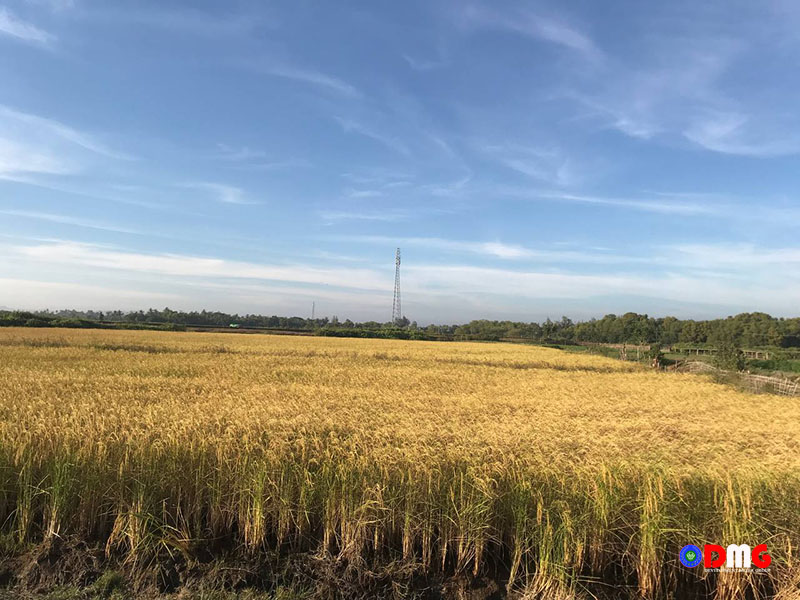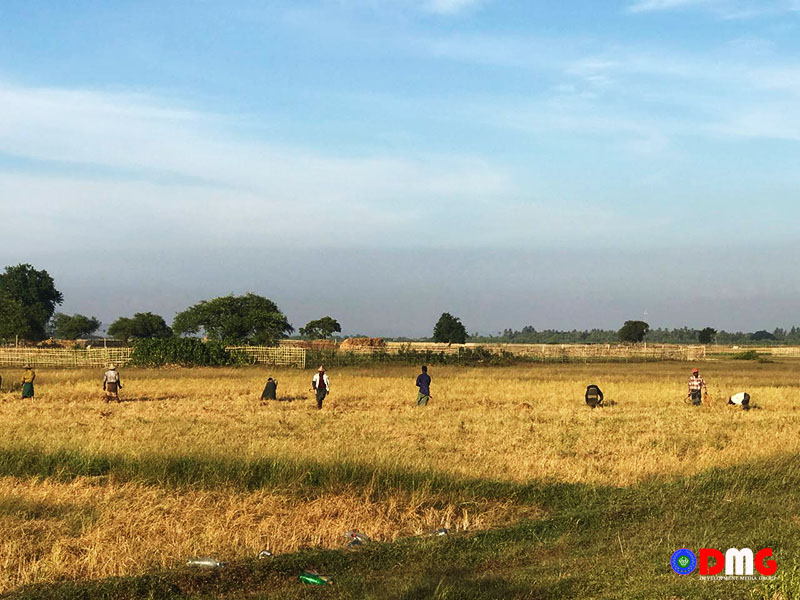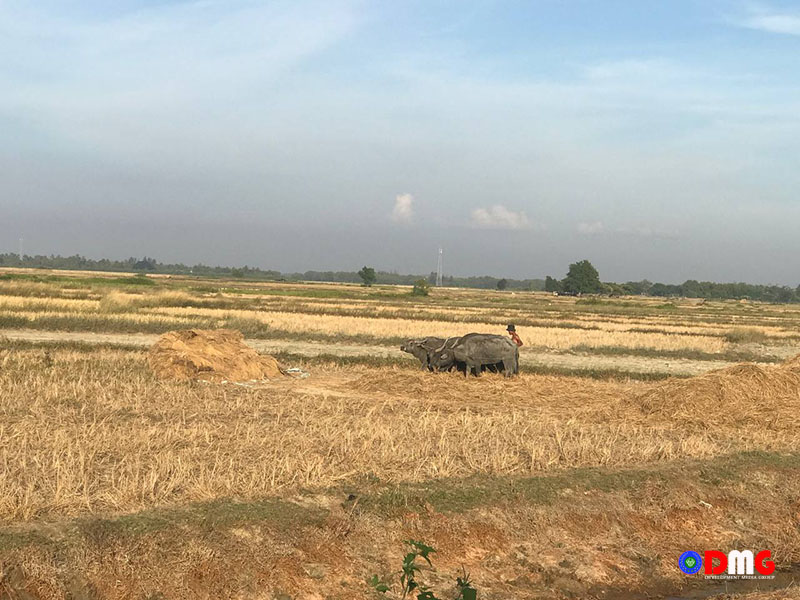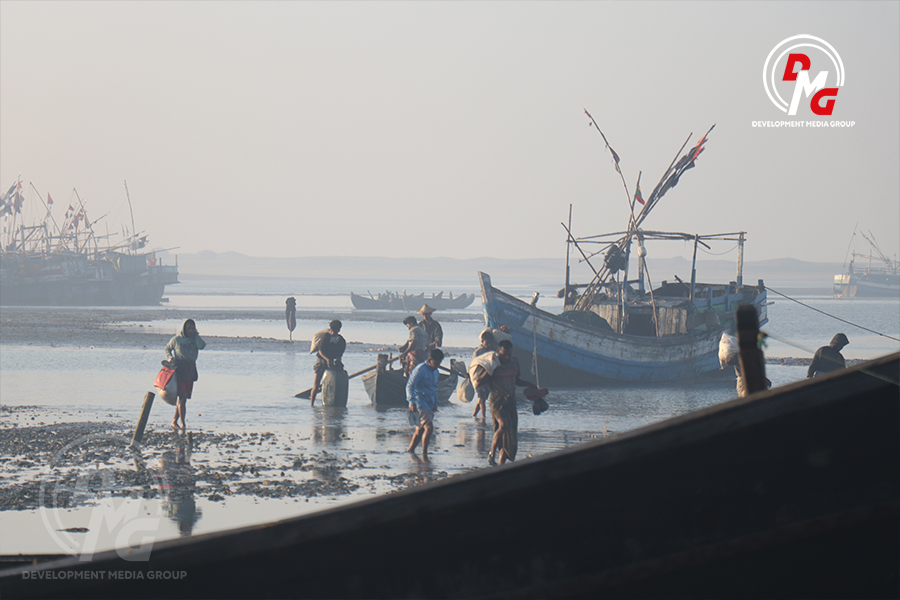- Weekly Highlights from Arakan State (Jan 26 to Feb 1, 2026)
- Arakanese youth stabbed in Mae Sot urgently needs financial aid for medical treatment
- Five years on Myanmar faces uncertain military and political outlook after coup
- Myanmar Navy detains Pauktaw fishermen and demands ransom
- Junta Airstrikes on Arakan and the Consequences for Independent Media
Multiple crises leave Arakan State farmers struggling to repay agricultural loans
Farmers suffering from the impacts of military conflict, displacement, climate change and high prices for inputs like fertiliser and fuel this year are struggling to repay their agricultural loans.
22 Dec 2022

DMG Newsroom
22 December 2022, Sittwe
Farmers suffering from the impacts of military conflict, displacement, climate change and high prices for inputs like fertiliser and fuel this year are struggling to repay their agricultural loans.
“We would be able to repay agricultural loans as long as we could engage in farming properly. We borrowed money from others to buy agricultural inputs such as fertiliser and seeds. We harvested paddy but we went into debt as paddy yield was not good,” Daw Saw Than Aye, a local farmer from Rathedaung Township, told DMG.
U Soe Naing, a farmer from Tinnyo Village, Mrauk-U Township, said that they want to extend the repayment period of agricultural loans beyond the specified time due to the difficulties of farmers.
“If the government is asking for [repayment of] agricultural loans from farmers, we will have a bad situation. I would like to ask the government to do something for the farmers. If you can’t pay off the agricultural loan and the interest rate goes up over the years, you won’t be able to pay it off,” he said.
An official from the Arakan Farmers’ Union said that only a small number of farmers will be able to repay their agricultural loans on time as most of the farmers in Arakan State are facing financial losses this year.

U Kyaw Zan, chairman of the Arakan Farmers’ Union, said that if the government gradually eases the burden on farmers who are having trouble repaying agricultural loans, life will be a little easier for the farmers.
“Farmers will not be able to repay agricultural loans this year. First, the government should reduce the loans of farmers who do not grow paddy at all. The government should waive interest rates for farmers who cannot work consistently for at least three years due to bad rice yields. The government should take responsibility and solve the farmers’ crisis,” he added.
Farmers have to repay monsoon agricultural loans by mid-April. However, many farmers in Arakan State have not yet even been able to repay agricultural loans they received in 2021.
Previous outstanding agricultural loans and this year’s loans are being collected by the respective township banks, according to the Myanmar Agricultural Development Bank (Arakan State branch).
U Ba Kyaw Sein, manager of the Myanmar Agricultural Development Bank (Arakan State branch) told DMG that employees from the state-owned bank are collecting on people who have not repaid agricultural loans in a timely manner.
“If farmers are unable to repay the agricultural loans in full, they can repay as much as they can. If farmers delay in repaying agricultural loans, the interest will be more than the loans. If the farmers repay the agricultural loans later than the specified time, there will be increased fines. In the past, the farms of farmers who could not pay their debts were confiscated,” he said.

U Ba Kyaw Sein told DMG that most farmers who can’t repay their agricultural loans are from the northern townships of Arakan State. Until now, only about 60 percent of farmers have been able to repay the agricultural loans they took out in 2021.
According to the Arakan Farmers’ Union, about 30 percent of farmers in Arakan State, who are facing difficulties every year, leave their land and go abroad for work.
“About 30 percent of farmers will be in a situation where they will give up their land. Those who have gone abroad and those who work on rented farms are also in a situation where they cannot repay their debts. Those who continue to work in agriculture are also facing various difficulties,” U Kyaw Zan said.
There are many farmers in parts of northern Arakan State who could not harvest ripe paddy due to this year’s conflict between the military and Arakan Army (AA).
Farmers are facing financial losses yearly and the number of people working in agriculture is decreasing year after year due to military conflicts, the Covid-19 pandemic and natural disasters.
Less than 900,000 out of 1.2 million acres of arable land in Arakan State could be cultivated this year due to the high cost of farming, conflict, and about 50,000 acres of farmlands that were damaged by storms.















.jpg)

